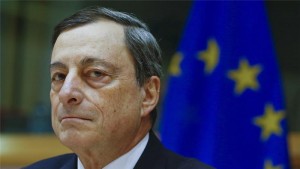The European Central Bank has cut its main interest rate to 0 percent from 0.05 percent, in a surprise move aimed at boosting eurozone economies. The bank, known as the ECB, said on Thursday that it will expand its asset-buying programme and will increase its monthly bond purchases from €60bn to €80bn ($67bn-$89bn), pushing more newly printed money into the economy.
The bolder-than-expected stimulus package also included a reduction in the interest rate on deposits held by banks at the ECB to minus 0.4 percent, from minus 0.3 percent. The scheme also includes long-term cheap loans of up to four years to help support banks. Mario Draghi, the ECB president, said the measures would “reinforce” the momentum of the eurozone economic recovery and “accelerate” the return of inflation to close to, but below, 2 percent.
Yet, European stocks markets closed sharply lower as investors appearred unconvinced by the stimulus measures. In Germany, DAX ended the day down by 2.3 percent after initially rising on the ECB announcement, while France’s CAC 40 fell by 1.7 percent. The euro, which tends to weaken with more stimulus, was 1.6 percent higher at $1.1172, having earlier tanked by 1.2 percent.
The negative rate on deposits – in essence, a tax on bank’s excess funds – is aimed at pushing banks to lend rather than leave money at the central bank. More lending would promote growth and push up inflation from a worryingly low annual rate of minus 0.2 percent. The rate cut and the other measures to expand stimulus underline how far the ECB sees itself from achieving its goal of inflation of just under 2 percent.





